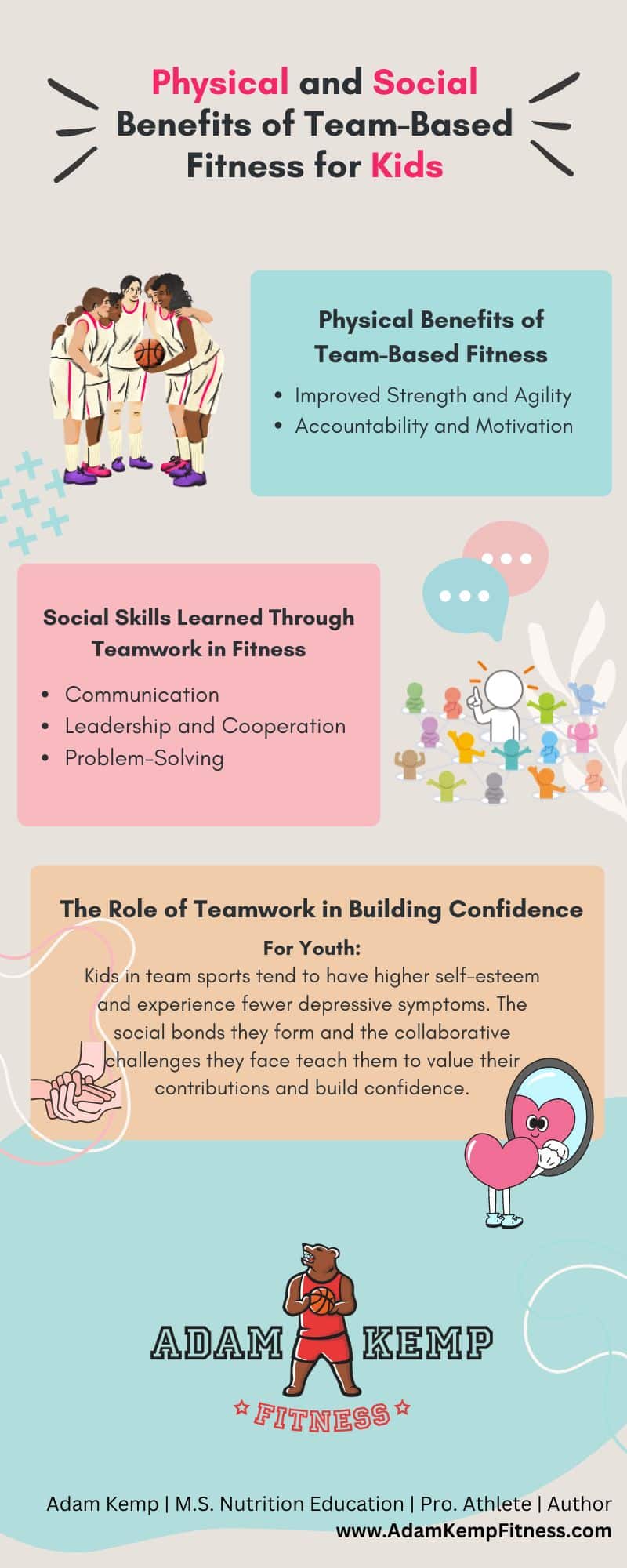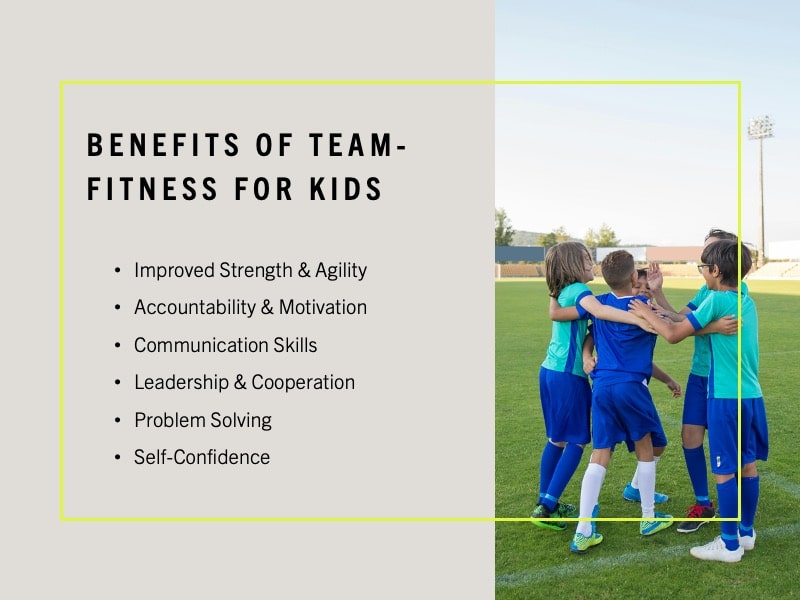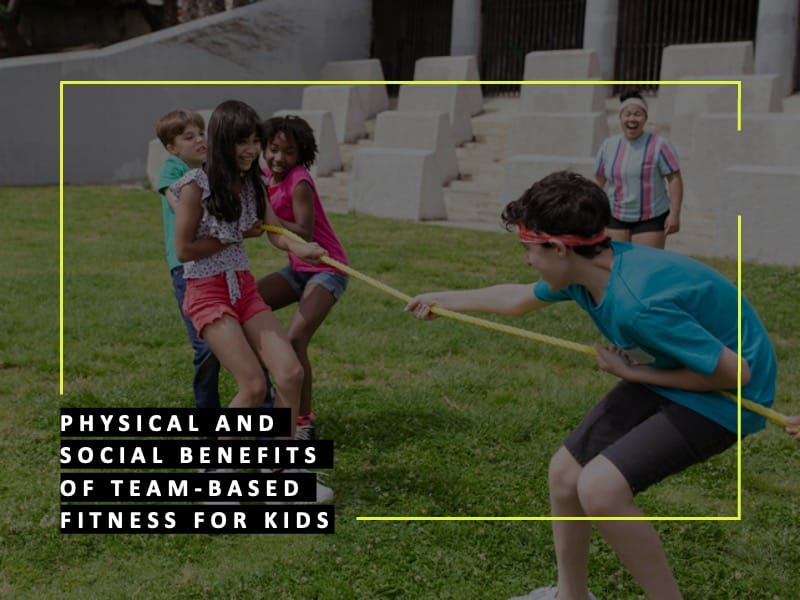Physical and Social Benefits of Team-Based Fitness for Kids
Imagine a group of friends tackling a challenging obstacle course, laughing and cheering each other on. This isn’t just exercise—it’s teamwork fitness in action. With screens becoming a more significant part of our lives, physical activities that build both fitness and social skills are more critical than ever.
Team fitness goes beyond improving physical strength; it enhances communication, leadership, and problem-solving skills. It’s no secret that sports improve children’s academic performance, and adding team fitness or sports to your child’s schedule will support them for life in several ways.
As a professional athlete with two college degrees, a wife, and a healthy school-age son, the physical and social benefits of team fitness activities are imprinted on my life.
Whether you’re a fitness enthusiast looking to improve yourself or a parent looking to help your child build confidence, teamwork fitness offers a unique and effective solution to boost motivation, improve communication, and build communities.

Physical Benefits of Team-Based Fitness
When it comes to improving our physical health, teamwork workouts offer a unique and powerful approach. These collaborative exercises not only make fitness more enjoyable but also provide a range of benefits that can significantly enhance our overall well-being.
Improved Strength and Agility
Participating in team sports can reduce obesity and increase overall health, with at least 150 minutes of moderate-intensity exercise or 75 minutes of vigorous-intensity exercise recommended per week.
By meeting or exceeding these recommendations through group fitness activities, we’re not just building strength and agility – we’re actively combating obesity and improving our overall health.
The friendly competition and mutual support in Teamwork Workouts often push participants to work harder, leading to better results.
Whether it’s partner resistance exercises, group circuit training, or team sports, these activities challenge our bodies in diverse ways, promoting muscle growth and improving our ability to move quickly and efficiently.
Accountability and Motivation
Exercise in team sports can lead to a unique state of short-term relaxation, promoting increased concentration, better memory, enhanced creativity, and an improved mood.
Along with these mental health benefits, team-based workouts are also great for holding you accountable and motivating you to work out.
One of the most powerful aspects of teamwork workouts is the built-in accountability and motivation they provide. When we commit to exercising with others, we’re less likely to skip workouts or give up on our fitness goals.
The knowledge that our teammates are counting on us can be a powerful motivator, pushing us to show up even on days when we might otherwise make excuses.
Moreover, the social aspect of teamwork workouts can make exercise feel less like a chore and more like an enjoyable activity. The camaraderie and shared goals create a positive atmosphere that can help us stay committed to our fitness journey in the long term.
This social support network can be particularly beneficial during challenging times or when facing fitness plateaus.
Social Skills Learned Through Teamwork in Fitness
While the physical benefits of teamwork in fitness are evident, the social skills developed through these activities are equally valuable.
Fitness team-building exercises provide a unique platform for individuals to enhance their interpersonal abilities, fostering an environment where communication, leadership, cooperation, and problem-solving skills can flourish.
Communication
Without a doubt, I believe communication is the number one key to a successful team. Communication covers mistakes and helps people move on from mistakes, which is critical in sports, fitness, and life.
Participants learn to articulate their thoughts, give and receive feedback, and express their needs within the team dynamic, and this skill extends far beyond the gym or playing field, benefiting individuals in their personal and professional lives.
Team-building activities can boost team cohesiveness, motivation, and productivity, leading to better performance and higher morale.
These improvements in team dynamics are largely due to enhanced communication skills. As I’ve experienced during my career as an athlete, as team members learn to communicate more effectively, they build stronger relationships, leading to a more cohesive and motivated group.
Leadership and Cooperation
Fitness team-building activities provide opportunities for individuals to develop both leadership and cooperation skills.
In a team setting, members often take turns leading exercises, motivating others, or strategizing for group challenges. This rotation of roles allows everyone to experience leadership moments while also learning how to be supportive team players.
As an athlete who was captain of several sports teams during their life, it is clear how these roles and opportunities benefitted my long-term social and interpersonal communication skills.
Teams with high levels of cohesiveness tend to display an enthusiastic commitment to a unified goal and are more optimistic on and off the field. This cohesiveness is a direct result of improved leadership and cooperation skills.
Problem-Solving
Fitness team building exercises often present participants with physical and mental challenges that require creative problem-solving. Whether it’s figuring out the most efficient way to complete a group workout, strategizing for a team sport, or overcoming obstacles in a fitness challenge, these activities encourage quick thinking and collaborative problem-solving.
The ability to work together to find solutions under pressure is a skill that translates well to many aspects of life. It fosters creativity, critical thinking, and adaptability – all crucial skills in today’s fast-paced world.
Good social relations, such as those formed through teamwork, can lead to up to a 50% increase in longevity and strengthen the immune system. This remarkable statistic underscores the profound impact that the social skills developed through fitness team building can have on our overall well-being.
By improving our ability to communicate, lead, cooperate, and solve problems together, we’re not just enhancing our social skills – we’re potentially adding years to our lives and boosting our health in the process.
The Role of Teamwork in Building Confidence
Teamwork in fitness plays a crucial role in building confidence, particularly for young individuals. The collaborative nature of team-based activities provides a supportive environment where children and teenagers can develop self-assurance, resilience, and a positive self-image.
This is especially important in today’s world, where youth face numerous challenges and pressures.
For Youth
For young people, teamwork in fitness goes beyond physical health—it builds confidence and character.
At Mission Grit, team-based activities like obstacle courses help shy children become more self-assured by fostering a sense of belonging and shared achievement.
Kids in team sports tend to have higher self-esteem and experience fewer depressive symptoms, and structured fitness classes for kids offer many of the same benefits!
The social bonds they form and the collaborative challenges they face teach them to value their contributions and build confidence.
The sense of community also encourages risk-taking and personal growth, both on and off the field.
Lastly, teamwork in fitness is also linked to better academic outcomes, with athletes often showing improved GPAs. This cognitive boost reinforces confidence and creates a positive cycle of self-assurance and achievement.
Final Thoughts: Why Is Team Fitness Good for Children and Adults?

There are many benefits of sports and team-based fitness activities for kids, regardless of whether or not your child wants a life in athletics or to become a professional athlete.
Teamwork in fitness goes far beyond improving physical strength—it cultivates essential life skills like communication, leadership, cooperation, and problem-solving. Through collaborative activities, participants boost both their physical abilities and social skills, creating a strong foundation for personal development.
For young people, teamwork in fitness also plays a crucial role in building confidence. By engaging in team-based challenges, they gain self-assurance, form valuable social bonds, and develop a sense of belonging.
Whether you’re aiming to improve physical fitness or foster personal growth, teamwork in fitness offers a dynamic and holistic approach for well-rounded development, benefiting individuals of all ages.
Read Next: Top 10 Health And Fitness Tips for Children
This website does not provide medical advice. This website site does contain affiliate links, and purchases may earn a commission.
Read my Medical Disclaimer, Review Disclaimer, and Publishing Policies for more details. Use of this site indicates acceptance of these terms.



